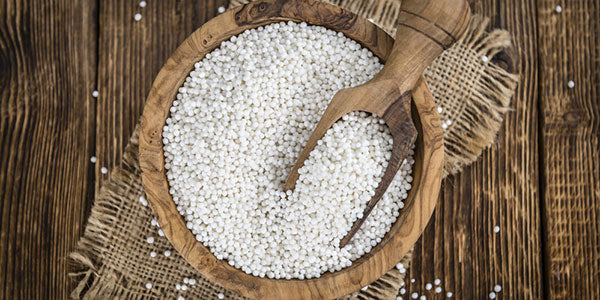
Tapioca is more than just a type of pudding cup in your grocery store.
And though the sweetness and creaminess may be desired, tapioca can be used in baked goods as a thickening ingredient. It also lends some worthy health benefits.
So what is tapioca and how can the body benefit from its versatile use and intake?
What Is Tapioca?
Tapioca is made from cassava, which is a tuberous plant similar to a potato and native to South America. Tapioca is extracted from the cassava root and known as tapioca starch.
The starchy flesh is produced into the well-known tapioca pearls or also into flakes, granules, or powders. Most commonly the small bead products are used in puddings and boba teas. However, it also serves as a thickening agent and is added to both savory and sweet dishes.
Though annually cultivated in tropical and subtropical regions, its use continues to expand along with its explored health benefits.
Tapioca Nutrition Facts
The starch from the cassava root classifies tapioca as a carbohydrate source. The graph below shines a light on just how much carbohydrate is offered.

Tapioca is devoid of significant amounts of protein and fat. However, it does offer several micronutrients, including calcium, folic acid, and iron.
6 Tapioca Benefits
From supporting heart health to building strong bones, here is how tapioca benefits the body.
1. Tapioca can help meet fiber needs.
Dietary fiber is a plant component that cannot be absorbed or digested by the body. Fiber plays a key role in digestive and heart health. It also helps regulate blood sugars and supports a healthy weight.
The fiber content is not a lot but most people do not enough of it. In fact, the average fiber intake in the U.S. is only 15 grams.
The current intake falls very short compared to the 25 to 38 gram per day recommendation. However, including the starch can help meet those needs.
2. Tapioca supports cardiovascular health.
Again, the fiber content is small, but it may be able to reduce high cholesterol levels. This is especially true when combined with other fiber-rich sources, such as whole grains, legumes, and fresh fruit and veggies. Achieving and maintaining healthy cholesterol levels reduces the risk of heart disease, including heart attack and stroke.
Tapioca also contains iron, a mineral essential for forming red blood cells so oxygen can be distributed throughout the body. It supplies folic acid, too. Also recognized as folate, folic acid assists in the development of red blood cells, and all new cells for that matter.
3. Tapioca promotes cell growth.
Though the general population requires folic acid for critical body processes, its intake is imperative for pregnant women. Folic acid helps the body produce new cells and is vital for a developing brain and spine.
Women of childbearing years are encouraged to consume or supplement adequate amounts of folic acid, at least 400 micrograms each day. This helps protect from neural tube defects that can develop in the first three months of pregnancy.

4. Tapioca helps build strong bones.
While tapioca does not offer extensive calcium like milk and dairy products, it does offer some. So for those with lactose intolerance or dairy allergy, it is a great alternative to achieve calcium needs.
The mineral is imperative for strong, healthy bones and reduces the risk of osteoporosis and bone fractures.
5. Tapioca is free of common allergens.
Grain-free, nut-free, and gluten-free. Tapioca is them all.
Being free of these common allergens offers an option for those needing to eliminate them. This includes individuals managing celiac disease or an allergy to wheat.
The starch can replace various flours and thickeners in gluten-free recipes. This may be in combination with other gluten-free options, including potato starch. Gluten-free baking ideas with tapioca flour include pumpkin muffins, pancakes, and zucchini bread.
6. Tapioca can lead to healthy weight gain.
Though people tend to desire weight loss over weight gain, some underweight individuals may have trouble packing on pounds.
Several health conditions may hither individuals to gain weight, including cancer and cystic fibrosis. Some athletes may be trying to pack on "healthy" weight without increasing processed, energy-dense foods.
Since tapioca is naturally calorically dense on its own, its use can enhance overall total calories without added oils and sugars. Besides, a half-cup contains about 14 percent of daily caloric needs based on a 2,000 calorie per day diet!
Bottom Line: Is Tapioca Healthy?
While tapioca does prove benefit, health experts warn its use.
With weight loss and management in mind, it is important to stay mindful of servings and portions consumed. Those managing blood sugars should also limit their intake related to its high carb content.
The starch also falls nutritionally short to similar sources such as wheat flour. However, it is an excellent gluten-free diet alternative. Combining it with coconut, almond, and other gluten-free flours can help boost the nutritional value.
WebMD also warns cassava contains chemicals called cyanogenic glycosides, which may be toxic to cancer cells. However, preparing correctly helps prevent cyanide poisoning. Also, be sure to purchase from reliable sources.
With proper handling and consumption, the cassava plant can be a safe addition to a balanced diet.







